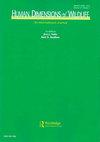实习教师的野生动物价值取向是否会影响他们对不同栖息地群体的食肉动物物种的管理行为的判断?
IF 1.7
4区 环境科学与生态学
Q2 BIODIVERSITY CONSERVATION
引用次数: 1
摘要
摘要德国对食肉动物物种的致命管理因物种栖息地状况(即新来物种、长期定居物种或重新定居物种)而异。管理行为并不总是被公众所接受。由于未来的教师是公众接受致命管理的未来乘数,并且教学受到个人价值取向的影响,我们调查了学生教师(N=95)对不同栖息地状态群体的食肉动物物种的致命管理决定与其野生动物价值取向(WVOs)的关系。我们的研究结果表明,与长期建立的物种相比,师生的WVOs与新来物种和重新定居物种的某些管理行动更密切相关。在这些情况下,他们的WVO更有可能影响管理行动背景下的决策教学。因此,教师教育应支持学生教师反映他们在教授当地生物多样性保护方面的价值取向。本文章由计算机程序翻译,如有差异,请以英文原文为准。
Do student teachers’ wildlife value orientations impact how they judge management actions of carnivore species from different habitat status groups?
ABSTRACT Lethal management of carnivore species in Germany differs according to the species habitat status (i.e., for new arrivals, long-established, or re-colonizing species). Management actions are not always accepted by the public. Since prospective teachers are future multipliers of public acceptance of lethal management, and teaching is influenced by ones’ value orientations, we investigated student teachers’ (N = 95) decisions on lethal management of carnivore species of different habitat status groups in relation to their wildlife value orientations (WVOs). Our results show that student teachers’ WVOs are more strongly associated with certain management actions for new arrivals and re-colonizing species than for long-established species. In those cases, their WVOs are more likely to affect teaching of decision-making in the context of management actions. Thus, teacher education should support student teachers in reflecting their value orientations for teaching local biodiversity protection.
求助全文
通过发布文献求助,成功后即可免费获取论文全文。
去求助
来源期刊

Human Dimensions of Wildlife
Environmental Science-Nature and Landscape Conservation
CiteScore
4.40
自引率
12.50%
发文量
33
期刊介绍:
Human Dimensions of Wildlife is devoted to the study of social considerations in fisheries and wildlife management.
 求助内容:
求助内容: 应助结果提醒方式:
应助结果提醒方式:


